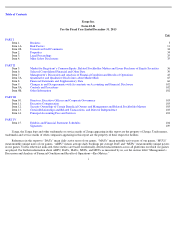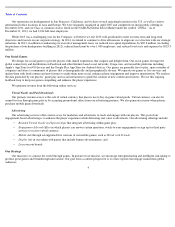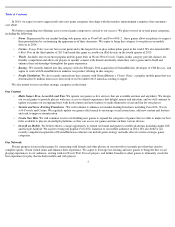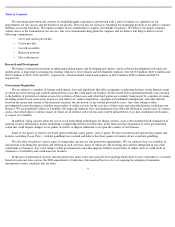Zynga 2013 Annual Report Download - page 12
Download and view the complete annual report
Please find page 12 of the 2013 Zynga annual report below. You can navigate through the pages in the report by either clicking on the pages listed below, or by using the keyword search tool below to find specific information within the annual report.
Table of Contents
Companies in the Internet, games, social media, technology and other industries may own large numbers of patents, copyrights and
trademarks and may frequently request license agreements, threaten litigation or file suit against us based on allegations of infringement or other
violations of intellectual property rights. From time to time, we have faced, and we expect to face in the future, allegations by third parties,
including our competitors and non-practicing entities, that we have infringed their copyrights, trademarks, patents and other intellectual property
rights. As we face increasing competition and as our business grows, including into new areas, we will likely face more claims of infringement.
Competition
We face significant competition in all aspects of our business. Specifically, we compete for the leisure time, attention and discretionary
spending of our players with other social game developers on the basis of a number of factors, including quality of player experience, brand
awareness and reputation and access to distribution channels.
We believe we compete favorably on these factors. However, our industry is evolving rapidly and is becoming increasingly competitive.
Other developers of social games could develop more compelling content that competes with our social games and adversely affects our ability
to attract and retain players and their entertainment time. These competitors, including companies of which we may not be currently aware, may
take advantage of social networks, access to a large user base and their network effects to grow rapidly and virally.
Our competitors include:
Our Mission and Core Commitments
We were founded on a deeply held passion for games and for family and friends playing together. Our passion for delivering great
consumer experiences is at the core of our mission: to connect the world through games. Our mission and our core commitments form the
foundation for everything we do: design social games that everyone wants to play, assemble and retain talented teams, prioritize our
opportunities and make investment decisions.
8
•
Developers for Web and Mobile Games:
We face competition from a number of competitors who develop web and mobile games.
These competitors, some of which have significant financial, technical and other resources, greater name recognition and have longer
operating histories, may create similar games to reach our players. The mobile game sector specifically is characterized by frequent
product introductions, rapidly emerging mobile platforms, new technologies and new mobile application storefronts. Some of these
competitors include Electronic Arts Inc., King.com, and The Walt Disney Company, DeNA Co. Ltd., Gameloft, Glu Mobile, GREE
International Inc., Gungho Online Entertainment Inc., Kabam, Rovio Mobile Ltd. and Supercell. Because our games are free to play,
we compete primarily on the basis of player experience rather than price. We also expect new competitors to enter the market and
existing competitors to allocate more resources to develop and market competing games and applications.
•
Other Game Developers: Our players may also play other games on personal computers and consoles, some of which include social
features that compete with our social games and have community functions where game developers can engage with their players.
Some of these competitors include Activision Blizzard, Inc., Electronic Arts, Riot Games, Valve, Take-Two Interactive, SEGA of
America, Inc. and The Walt Disney Company.
•
Other Forms of Media and Entertainment: We compete more broadly for the leisure time and attention of our players with providers
of other forms of Internet and mobile entertainment, including social networking, online casual entertainment and music. To the
extent existing or potential players choose to read, watch or listen to online content or streaming video or radio, play interactive video
games at home or on their computer or mobile devices rather than play social games, these content services pose a competitive threat.
























